
BEIRUT, Lebanon- Syria’s Kurds fear a “stab in the back” by Turkey if they join a push to drive Islamic State from its Syrian capital of Raqqa, one of their chief political leaders told Reuters on Tuesday.
The remarks by Salih Muslim, joint chairman of the main Syrian Kurdish party, the Democratic Union Party (PYD), underscore how friction between Turkey and Syrian Kurds threatens to undermine efforts to combat their mutual enemy Islamic State.
“It is very important that Raqqa is liberated. But one point which is bothering us is that, if we go toward Raqqa, we will be stabbed from the back,” he said.
He did not know when an offensive on Raqqa might begin and called on the United States to ensure Turkey would not strike against Kurdish areas when it took place.
“Maybe they will try to occupy Kobani or Tel Abyad,” he said, referring to Turkish forces and two large Syrian towns in Kurdish-controlled areas near the border.
Kurdish militia have played a big role over the past year in the Syrian Democratic Forces (SDF), a U.S.-backed umbrella group, as it has seized large areas of territory from Islamic State, laying the ground for an assault on Raqqa.
However, Turkey’s intervention in Syria in August in support of rebel groups fighting under the Free Syrian Army (FSA) banner has complicated that equation, leading to clashes between them and Kurdish groups allied to the SDF.
Ankara’s intervention was aimed to both drive Islamic State from positions it had used to shell Turkish towns and to stop two Kurdish enclaves from physically uniting, thereby creating a de facto Kurdish mini-state along Turkey’s frontier.
During the weekend, Turkey-backed FSA groups and Syrian Kurdish fighters allied to the SDF fought near the Islamic State-held town of al-Bab, north of Aleppo. Turkey has also warned Kurdish fighters to retreat from around Manbij.
INSURGENCY
Turkey believes the Kurdish YPG militia, allied to the PYD and the strongest element of the SDF, is closely tied to the Kurdistan Workers Party (PKK), which has fought an insurgency against Ankara for three decades.
The YPG and PKK both deny having direct ties, although both say they are part of a wider confederation of similarly minded Kurdish parties in different countries.
Muslim and other Syrian Kurdish politicians have accused Turkey of supporting Islamic State, something Ankara vehemently denies, and say its incursion into areas held by the jihadist group is aimed at preventing a wider assault on it.
He has also accused Turkey of ethnic cleansing in Kurdish areas occupied by the FSA, saying it has driven thousands of Kurds from their land in villages near the border.
The FSA groups backed by Turkey have taken a 30 km (19 mile) wide stretch of the Syrian border area and have pushed southwards towards the town of al-Bab, taking the symbolically important Islamic State village of Dabiq a week ago.
The advances by the FSA groups and those by the SDF have deprived the jihadist movement of its foothold on the Turkish border, an important route for supplies and recruits, and squeezed its territorial holdings.
Meanwhile, a string of air strikes by the U.S.-led coalition has killed a number of its senior leaders in Syria this year. Across the border, the Iraqi army and Kurdish forces backed by the U.S. have launched a major offensive against Islamic State’s most prized possession, the city of Mosul.
(Reuters)

Leave a Reply
You must be logged in to post a comment.